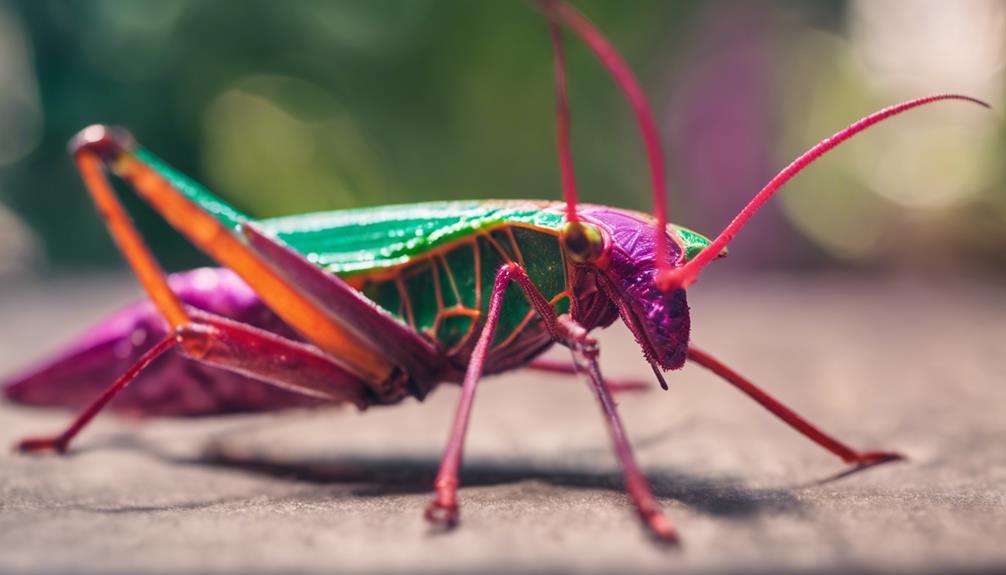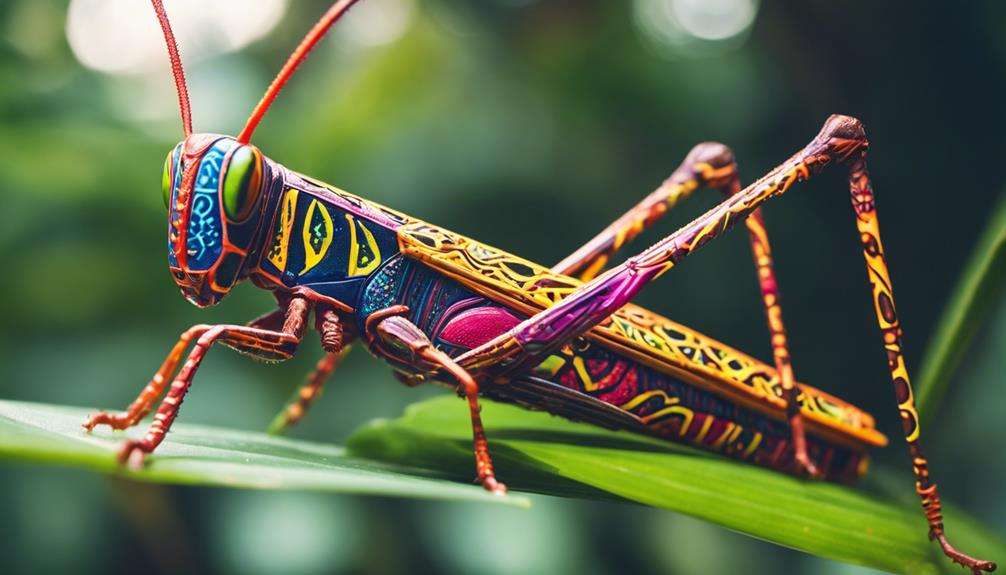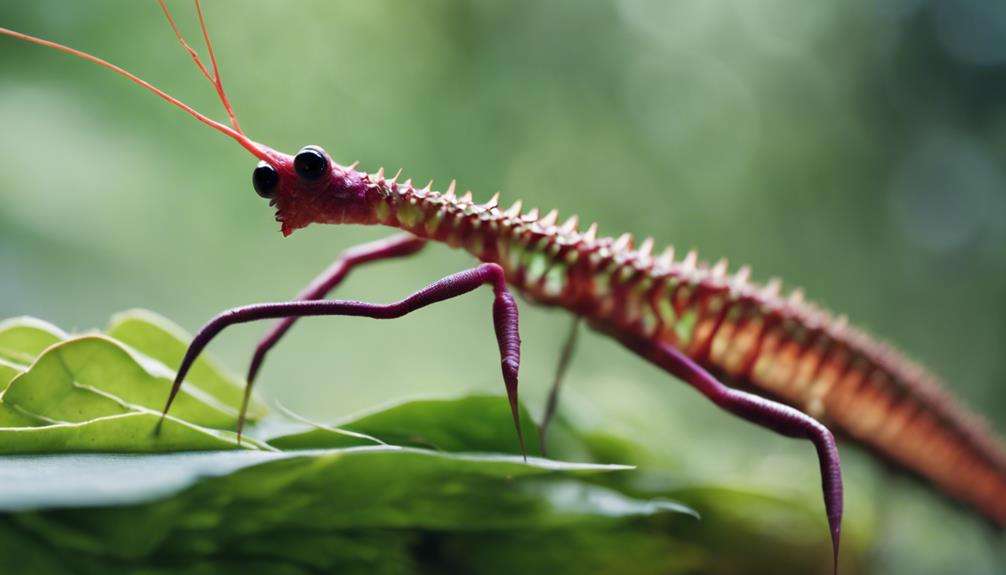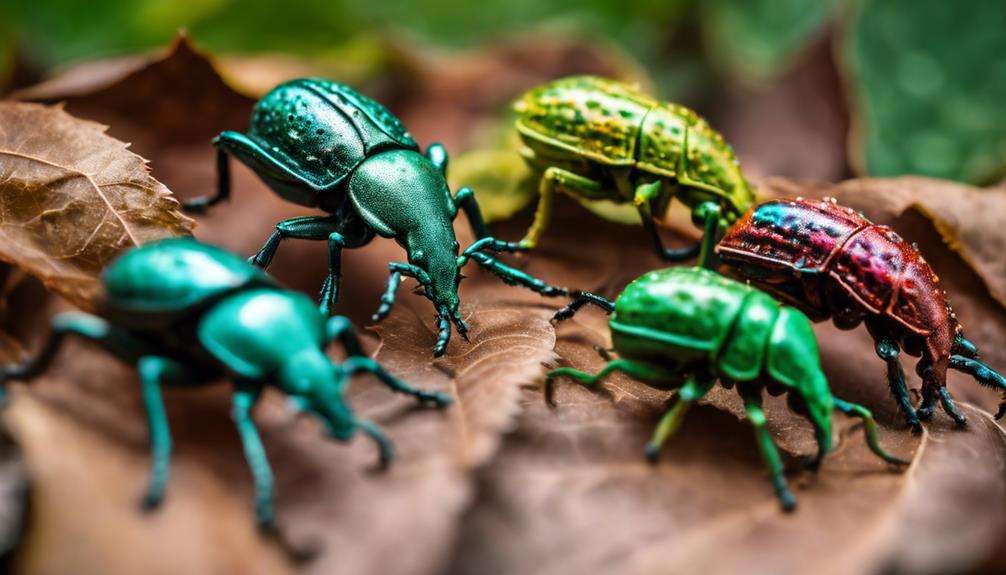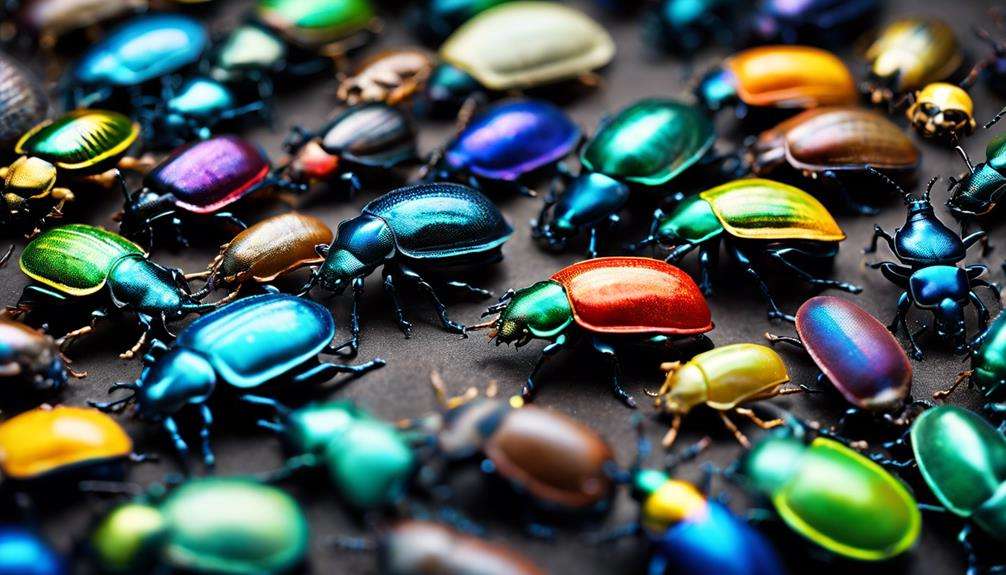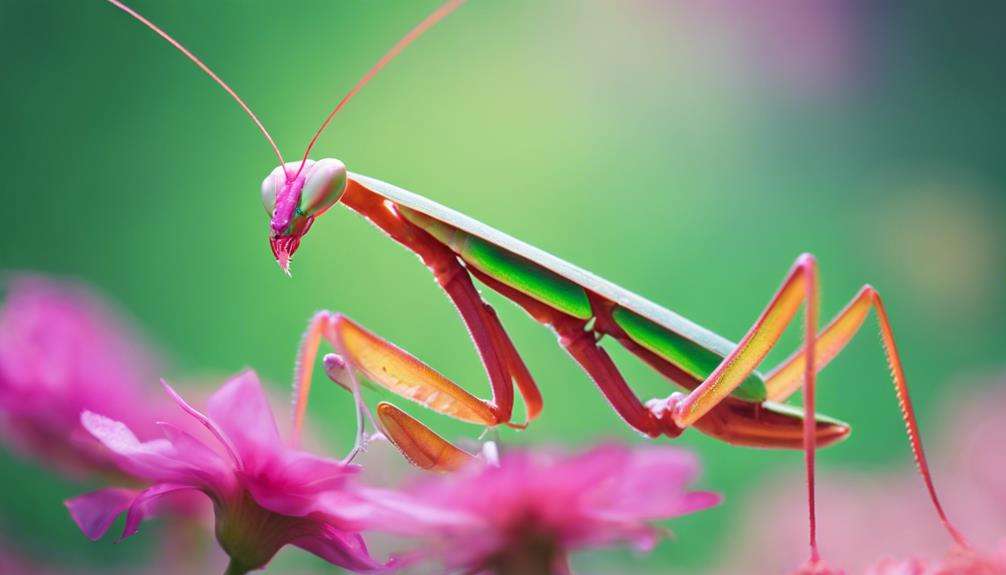If you're considering caring for the Malaysian jungle nymph, also known as the Heteropteryx dilatata, as an exotic pet, there are essential factors to keep in mind.
Ensuring the well-being of uncommon insects involves more than just providing a habitat; it requires knowledge of legal restrictions, specialized care requirements, and unique dietary needs.
Understanding how to navigate these aspects is crucial for a successful and fulfilling experience as an exotic pet owner.
Key Takeaways
- Customize habitats to mimic natural environments for exotic insect well-being.
- Comply with legal regulations on exotic insect ownership and conservation efforts.
- Provide specialized diets and healthcare for optimal exotic insect health.
- Enrich habitats with proper interaction and environmental enrichment for exotic insect stimulation.
Uncommon Insects as Exotic Pets
Uncommon insects, such as stick insects and leaf insects, offer exotic pet owners a fascinating glimpse into the intriguing world of insect companionship. Stick insects, resembling twigs, aren't only captivating to observe but also play a role in pest control by consuming leaves. When considering these bugs as pets, make sure to provide them with a warm environment to thrive.
Leaf insects, which mimic leaves, are low-maintenance pets that feed on berries and leaves. Ensuring dense vegetation in their habitat is crucial for their well-being. These unique creatures not only serve as interesting pets but also contribute to maintaining a balanced ecosystem within your home. By understanding their specific needs and behaviors, you can create a suitable environment for these insects to flourish.
In addition to being fascinating additions to your collection, stick insects and leaf insects can also offer a practical solution for natural pest control.
Legal Considerations for Exotic Insects
Regulations governing the ownership of exotic insects, enforced at both federal and state levels, aim to mitigate potential risks to public health and ecosystems. Compliance with shipping regulations, including the Lacey Act, is essential for legal ownership of exotic insects. Importing and exporting insects may require special permits and proper documentation to ensure legal acquisition. Endangered insect species are strictly protected by laws to prevent harm to their populations and habitats. Understanding the legal status of insects is crucial for responsible pet ownership and conservation efforts.
When considering legal aspects of owning exotic insects, keep in mind:
- Federal and State Regulations: Different jurisdictions may have varying laws regarding exotic insect ownership.
- Permit Requirements: Check for any necessary permits or licenses before acquiring exotic insects.
- Documentation: Keep thorough records of where your insects came from and any required paperwork.
- Conservation Efforts: Supporting ethical practices in insect acquisition can contribute to conservation goals.
Unique Care Requirements for Odd Insects
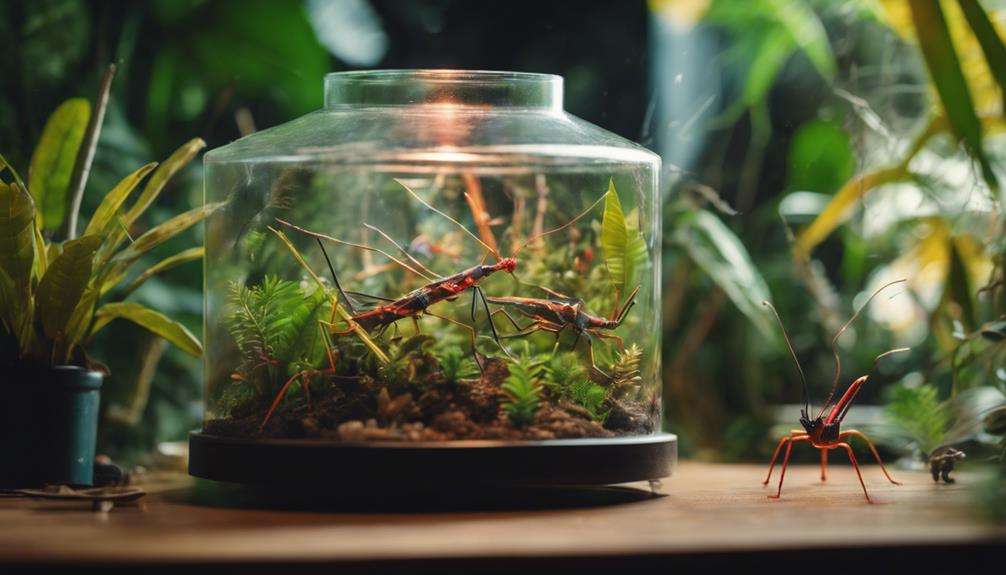
To properly care for odd insects like stick insects, leaf insects, tarantulas, praying mantises, and millipedes, you must consider their specialized housing needs and dietary requirements. Stick insects need a warm environment and a diet of berries and small branches, while leaf insects require dense vegetation for camouflage and feed on berries and leaves.
Tarantulas can reach lengths of up to 11 inches and exhibit behaviors like climbing or burrowing, whereas praying mantises rely on their hunting skills and camouflage to blend in with their surroundings.
Housing for Unusual Insects
For optimal care of odd insects like stick insects or leaf insects, meticulous attention to housing requirements is essential. When setting up a habitat for these unique creatures, consider the following:
- Terrarium essentials: Provide a terrarium that meets the specific temperature, humidity, and substrate needs of your unusual insects.
- Habitat customization: Create a space with dense vegetation and hiding spots to help your insects feel secure and display natural behaviors.
- Secure enclosure design: Ensure the enclosure is escape-proof to prevent your insects from wandering off or harming themselves.
- Understanding natural habitat: Tailor the living environment based on the natural habitat and behaviors of your odd insects to promote their well-being.
Specialized Diet Needs
When caring for odd insects with specialized diet needs, meticulous attention to their dietary requirements is crucial for their health and well-being.
Insect dietary restrictions vary greatly among different species. For example, the Madagascar Hissing Cockroach thrives on a diet of fruits and vegetables, while stick insects, camouflaging as twigs, feed on berries and small branches, showcasing their unique insect feeding habits.
Leaf insects, resembling leaves, require a diet of berries and leaves to sustain their specialized camouflage and feeding habits.
Tarantulas, with their predatory nature as climbers or burrowers, have specific dietary requirements tailored to their behavior.
Doodlebugs, the larval stage of ant lions, exhibit specialized diet needs by feeding on small insects and constructing sand traps for prey, highlighting their unique insect feeding habits.
Health and Safety Tips for Exotic Insects
Ensure the well-being of your exotic insects by maintaining a clean and adequately ventilated habitat.
Handle them with caution to prevent stress or harm, employing gentle methods to minimize risks.
Stay vigilant for common health issues and consult with a specialized veterinarian to address any concerns promptly.
Insect Habitat Cleanliness
To maintain the health and safety of your exotic insects, it's essential to regularly clean and sanitize their habitat to prevent the growth of harmful bacteria and mold. Here are some crucial tips to ensure a hygienic environment for your exotic pets:
- Remove uneaten food, feces, and shed skin to maintain cleanliness.
- Use safe cleaning products like mild soap and water to avoid exposing insects to toxic chemicals.
- Monitor humidity levels in the habitat to prevent bacterial growth.
- Properly dispose of any dead insects promptly to prevent the spread of disease.
Handling Precautions for Insects
Regularly practicing proper handling precautions is crucial for maintaining the health and safety of your exotic insects. When handling these unique creatures, consider potential risks such as skin irritation, injuries, or allergies.
Always wash your hands thoroughly after each interaction to prevent the spread of diseases and parasites. Utilize protective gloves when dealing with insects that have stingers or defensive mechanisms to avoid any harm.
Employ proper handling techniques to minimize stress on the insects and decrease the likelihood of accidental escapes. Understanding the specific care requirements and behaviors of your exotic insect species is essential for safe interactions.
Educate yourself to ensure you provide a secure environment and prevent any health considerations while handling your fascinating pets.
Common Insect Health Issues
Maintaining the health and safety of your exotic insects requires awareness of common health issues such as mites, fungal infections, and nutritional deficiencies. To ensure the well-being of your exotic pets, consider the following preventative measures for exotic insect illnesses:
- Regulate Environment: Proper humidity levels and temperature prevent respiratory issues.
- Regular Cleaning: Clean the insect enclosure frequently to prevent bacterial infections and parasitic infestations.
- Balanced Diet: Provide a varied diet to avoid nutritional deficiencies that can impact exotic insect health.
- Veterinary Consultation: Consult with a vet experienced in exotic insect care to address any health concerns promptly.
Unusual Insect Diet and Nutrition
Understanding the specific dietary requirements of exotic insects is essential for ensuring their health and well-being. Nutritional balance and dietary variety are crucial for exotic insects to thrive in captivity. Different unusual insects have specific dietary needs, such as fruit, vegetables, berries, and decaying greens.
Some insects, like crickets, require a diet that includes both greens and meat for a balanced nutrition. Providing a varied and suitable diet is essential to meet the nutritional needs of these unique pets. Feeding schedules should be established, taking into account the supplement requirements of each species to prevent deficiencies.
Proper nutrition not only supports the longevity of unusual insect pets but also plays a significant role in their overall health. Additionally, attention to digestive health and hydration needs is vital to maintain the well-being of exotic insects.
Enrichment Activities for Exotic Insects
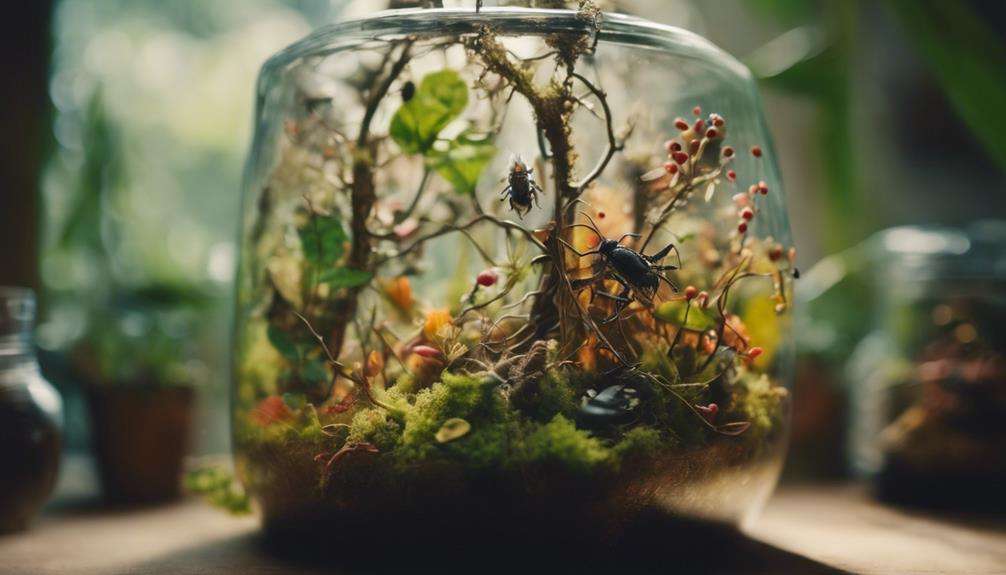
To ensure the overall well-being and mental stimulation of your exotic insects, incorporating enrichment activities that cater to their natural behaviors and senses is essential. Here are some tips to enhance the quality of life for your exotic insect:
- Behavioral enrichment: Provide climbing structures and hiding spots in the insect habitat to encourage natural behaviors and exploration.
- Sensory stimulation: Create a stimulating environment with different textures, smells, and sounds to engage your insect's senses and prevent boredom.
- Environmental diversity: Offer a variety of food items such as fruits, vegetables, and live insects to ensure a balanced diet for your exotic insect.
- Regular rotation of activities: Rotate and introduce new enrichment activities regularly to keep your exotic insect mentally and physically stimulated.
Monitoring your insect's behavior and adjusting enrichment activities based on their preferences and responses will contribute to their optimal well-being. By incorporating these enrichment activities, you can provide a fulfilling and engaging environment for your exotic insect.
Frequently Asked Questions
What Is the Best Insect to Keep as a Pet?
When deciding on the best insect to keep as a pet, consider factors like habitat needs, diet, and lifespan. Some insects make unique companions due to their bizarre behaviors, like camouflage or hunting. Understand care essentials for a successful experience.
What Is the Rarest Insect in the World?
Spot the rarest insect sightings found on Ball's Pyramid, the Lord Howe Island stick insect. Conservation efforts aim to safeguard this unique insect in its habitat. Explore this living fossil's story, a gem for conservation.
What Is the Most Unusual Insect?
The most unusual insect is the Goliath beetle. It stands out with its large size, impressive strength, and unique adaptations for survival. From bizarre behaviors to unusual habitats, these beetles captivate exotic pet owners worldwide.
What Bugs Like to Be Held?
Stick insects and Madagascar hissing cockroaches are receptive to handling, while leaf insects prefer minimal interaction. Tarantulas are best left undisturbed, and praying mantises are fragile and not ideal for frequent holding due to their delicate bodies.
Conclusion
In conclusion, as an exotic insect owner, you hold the key to a miniature world teeming with wonder and fascination. By understanding and abiding by the regulations governing these unique creatures, you aren't just a pet owner, but a steward of conservation efforts.
Remember, your careful attention to their needs and well-being will ensure a thriving and harmonious relationship with these extraordinary insects. Embrace the intricate beauty of your unconventional companions and watch as they enrich your world in ways you never imagined.

